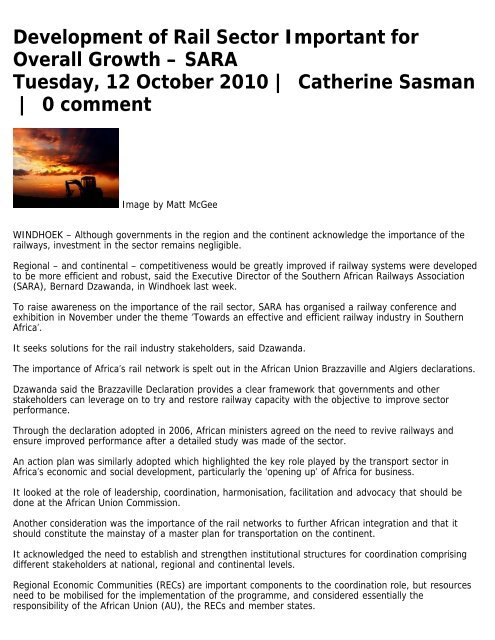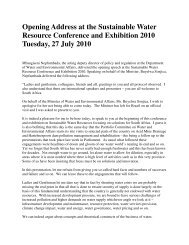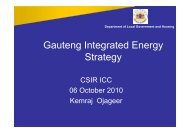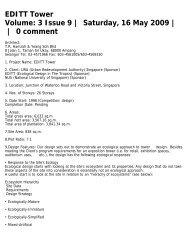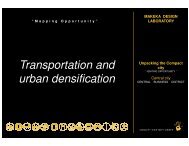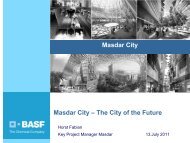Development of Rail Sector Important for Overall Growth - Alive2green
Development of Rail Sector Important for Overall Growth - Alive2green
Development of Rail Sector Important for Overall Growth - Alive2green
You also want an ePaper? Increase the reach of your titles
YUMPU automatically turns print PDFs into web optimized ePapers that Google loves.
<strong>Development</strong> <strong>of</strong> <strong>Rail</strong> <strong>Sector</strong> <strong>Important</strong> <strong>for</strong><br />
<strong>Overall</strong> <strong>Growth</strong> – SARA<br />
Tuesday, 12 October 2010 | Catherine Sasman<br />
| 0 comment<br />
Image by Matt McGee<br />
WINDHOEK – Although governments in the region and the continent acknowledge the importance <strong>of</strong> the<br />
railways, investment in the sector remains negligible.<br />
Regional – and continental – competitiveness would be greatly improved if railway systems were developed<br />
to be more efficient and robust, said the Executive Director <strong>of</strong> the Southern African <strong>Rail</strong>ways Association<br />
(SARA), Bernard Dzawanda, in Windhoek last week.<br />
To raise awareness on the importance <strong>of</strong> the rail sector, SARA has organised a railway conference and<br />
exhibition in November under the theme ‘Towards an effective and efficient railway industry in Southern<br />
Africa’.<br />
It seeks solutions <strong>for</strong> the rail industry stakeholders, said Dzawanda.<br />
The importance <strong>of</strong> Africa’s rail network is spelt out in the African Union Brazzaville and Algiers declarations.<br />
Dzawanda said the Brazzaville Declaration provides a clear framework that governments and other<br />
stakeholders can leverage on to try and restore railway capacity with the objective to improve sector<br />
per<strong>for</strong>mance.<br />
Through the declaration adopted in 2006, African ministers agreed on the need to revive railways and<br />
ensure improved per<strong>for</strong>mance after a detailed study was made <strong>of</strong> the sector.<br />
An action plan was similarly adopted which highlighted the key role played by the transport sector in<br />
Africa’s economic and social development, particularly the ‘opening up’ <strong>of</strong> Africa <strong>for</strong> business.<br />
It looked at the role <strong>of</strong> leadership, coordination, harmonisation, facilitation and advocacy that should be<br />
done at the African Union Commission.<br />
Another consideration was the importance <strong>of</strong> the rail networks to further African integration and that it<br />
should constitute the mainstay <strong>of</strong> a master plan <strong>for</strong> transportation on the continent.<br />
It acknowledged the need to establish and strengthen institutional structures <strong>for</strong> coordination comprising<br />
different stakeholders at national, regional and continental levels.<br />
Regional Economic Communities (RECs) are important components to the coordination role, but resources<br />
need to be mobilised <strong>for</strong> the implementation <strong>of</strong> the programme, and considered essentially the<br />
responsibility <strong>of</strong> the African Union (AU), the RECs and member states.
The declaration goes on to state that women have a place in the development and integration <strong>of</strong> the<br />
African railways.<br />
It said national, sub-regional and regional strategies should urgently promote railways as one way <strong>of</strong><br />
realising the Millennium <strong>Development</strong> Goals (MDGs), which have the deadline <strong>of</strong> 2015.<br />
In particular, these declarations point to the importance <strong>of</strong> regional railways and SARA as integral parts <strong>of</strong><br />
the North-South Corridor at a high-level conference held in Lusaka, Zambia in April 2008.<br />
SARA is an association <strong>of</strong> railways in the southern African region, and was <strong>for</strong>med in 1996, after it was<br />
acknowledged that a lobby group is needed to advocate <strong>for</strong> fair surface transport competition and service<br />
delivery by railway.<br />
But it is a SADC body, and its actions are guided by the SADC Protocol, which consolidated the existence <strong>of</strong><br />
SARA, giving effect to the <strong>for</strong>mation <strong>of</strong> regional associations to facilitative collaboration with other<br />
stakeholders.<br />
The members <strong>of</strong> SARA are railway operators in Namibia, South Africa, Zimbabwe, Botswana, Swaziland,<br />
Mozambique, Angola, Zambia, Tanzania and the Democratic Republic <strong>of</strong> Congo.<br />
But, said Dzawanda, railways in the southern African region and the continent at large are faced with the<br />
plethora <strong>of</strong> challenges, “whose origins are in a big way historical”, such as civil unrest and the fact that the<br />
building and maintenance <strong>of</strong> railway systems are very costly.<br />
<strong>Rail</strong>ways suffer from lack <strong>of</strong> investment, and are thus faced with critical capacity challenges. Lack <strong>of</strong><br />
investment has also resulted in poor conditions <strong>of</strong> infrastructure, as well as a shortage <strong>of</strong> locomotives and<br />
wagons.<br />
And, added Dzawanda, the resource element <strong>of</strong> railway service delivery should not be ignored, especially in<br />
view <strong>of</strong> the skills drain with many leaving the continent and no capacity to retrain staff, and the impact <strong>of</strong><br />
HIV/AIDS on the sector’s work<strong>for</strong>ce.<br />
Notwithstanding the challenges <strong>of</strong> the sector, per<strong>for</strong>mance <strong>of</strong> railways is high on SADC’s agenda.<br />
Regional ministers <strong>of</strong> transport last year discussed the evaluation <strong>of</strong> railway concessions, transportation <strong>of</strong><br />
hazardous materials by rail and approved a handbook on this matter, and considered infrastructure funding<br />
and waived a fuel levy <strong>for</strong> railways, which was welcomed by the industry.<br />
The ministers also agreed to create railway funds in member countries after years <strong>of</strong> lobbying from the<br />
industry players.<br />
Such a fund, said Dzawanda, would go a long way to level the playing field between the rail and road<br />
sectors.<br />
“The role <strong>of</strong> government in rail infrastructure development cannot be understated,” said Dzawanda.<br />
But huge challenges still remain.<br />
As far as infrastructure is concerned, there is a sore lack <strong>of</strong> investment in rail tracks – in construction and<br />
maintenance – there is a lack <strong>of</strong> connectivity, which is regarded as the “missing links”, and countries use<br />
different gauges across the region.<br />
In equipment, there is a shortage <strong>of</strong> locomotives and wagons, and there is a maintenance backlog <strong>of</strong> these.<br />
The region still has not harmonised its legislation regarding the railway sector and has to contend with<br />
different standards, as well as ownership and operations issues.
The Brazzaville Declaration undertook to include rail transport as an indispensable means <strong>of</strong> transport in<br />
national poverty alleviation and to ensure social and territorial cohesion.<br />
It gives priority to the integration <strong>of</strong> railways programmes, particularly to those that are geared towards the<br />
interconnection <strong>of</strong> national railway networks.<br />
Hence, it calls <strong>for</strong> the harmonisation <strong>of</strong> technical and commercial regulations, and the standardisation <strong>of</strong><br />
networks to promote inter-operationality, safe operation and good governance, and <strong>for</strong> greater viability <strong>of</strong><br />
African railway companies.<br />
There is also a call <strong>for</strong> the support and strengthening <strong>of</strong> the Union <strong>of</strong> African <strong>Rail</strong>ways (UAR), and <strong>for</strong> the<br />
investigation <strong>of</strong> the possibility to start a financing facility <strong>for</strong> railway development facilities, particularly<br />
through the creation <strong>of</strong> an infrastructure fund.<br />
The declaration stated that appropriate measures should be considered <strong>for</strong> the allotment <strong>of</strong> a “significant<br />
percentage” <strong>of</strong> nations’ Gross Domestic Product (GDP) to finance the sector.<br />
SADC ministers also considered this, but have not yet decided what percentage <strong>of</strong> the GDP should go<br />
towards this.<br />
Dzawanda said governments’ investment in rail infrastructure in line with the declaration are critical, but<br />
added that governments cannot go it alone; they need the inputs from the private sector in both operations<br />
and supply <strong>of</strong> equipment.<br />
He said governments on their part must assist in investments in infrastructure, the removal <strong>of</strong> tariff<br />
controls, the simplification and streamlining <strong>of</strong> customs procedures and <strong>for</strong>malities, to level the playing field<br />
between the rail and road sectors, waiver fuel levies <strong>of</strong> rail operators, and provide duty exemptions or<br />
concessions on imported railway equipment and materials <strong>for</strong> recapitalisation purposes.<br />
Source<br />
Source: New Era<br />
Website: www.newera.com.na/article.php?articleid=13539<br />
Author: Catherine Sasman<br />
Date: 12 October 2010


